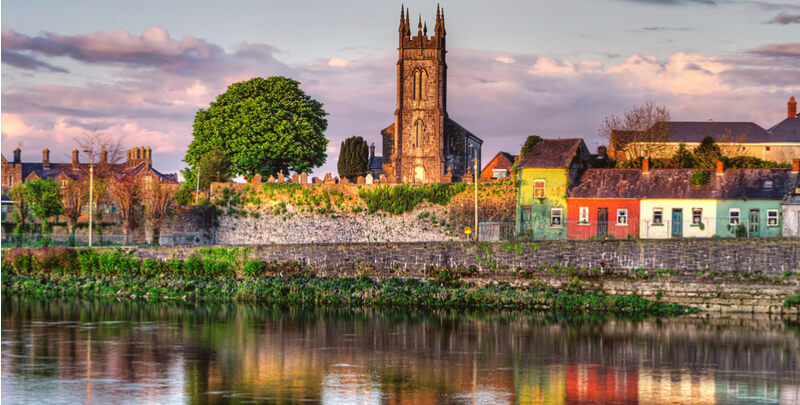Moving to Ireland from the USA: Everything you need to know
Moving to Ireland from the US? This guide covers all the essential information for relocating to Finland as an American, including tips and insights.

Ireland’s knowledge economy means that the many local and global firms based there pull in more than their fair share of highly skilled foreign workers. The Emerald Isle has much to offer, and it’s no surprise that many expats decide to put down roots and become Irish citizens.
There are benefits to being an Irish citizen, so whether you’re just now applying for a work visa in Ireland, or you’re an expat already living there, it’s good to know what the process entails.
Here’s a quick guide to why you might want to get Irish citizenship - and how you can go about it.
Citizens of Ireland have different rights (and responsibilities) to migrants holding permanent residence. Irish citizens, for example, have the right to vote in elections, and be elected in Ireland and elsewhere in Europe, although you only have the right to vote in Ireland for as long as you're living there.
One major selling point for Irish citizenship is that the Republic of Ireland has strong ties to Europe, and is a member of the EU. This means that its citizens enjoy the right to live and work freely across all member states, as well as access to some free healthcare elsewhere in Europe.
Don’t forget that the Republic of Ireland is a separate state to Northern Ireland, which is part of the United Kingdom. The notes below refer to the Republic of Ireland only.
You can apply for Irish citizenship if you have an Irish born parent or grandparent, or fulfil certain residency criteria. The residency requirements are fairly complex but basically mean you have to live in the Republic of Ireland for five years prior to applying to upgrade your residency to citizenship. This applies to EU citizens as well as people from the USA or elsewhere outside of Europe.
There’s a helpful Q&A on routes to Irish citizenship, on the citizen information website. Here you can find real examples of situations in which citizenship could be offered.
Regardless of the route you’re applying by, you have to fulfil certain basic requirements to be eligible. You must be of good character and prove a genuine commitment to the state, as well as making a promise to uphold the values of the country and abide by its laws.
Applications for Irish citizenship are managed by the Irish Naturalisation and Immigration Service and their website is a great place to look for process details, and application forms.
It’s possible to be a citizen of Ireland, as well as of another country, known as dual citizenship.
For this to be possible, the country (or countries) in which you already hold citizenship must also recognise the possibility of dual citizenship. The United Kingdom, for example, allows dual citizenship, but some other countries require you to give up your citizenship to accept another. If you’re in any doubt about your personal circumstances, it’s a good idea to seek the advice of an immigration lawyer.
There are several different routes to achieving Irish citizenship, but whichever route you take you’ll have to be of good character, meaning that you can provide a clean police record, fulfil certain residence requirements and have a genuine commitment to the state. The final decision on residency lies with the Minister for Justice and Equality.
If none of the routes outlined below fit your circumstance, then you can become an Irish citizen through naturalisation. To do this there’s a residency requirement, which basically means you must have been a resident in Ireland for the full year prior to your application, and for a further four years in the eight preceding that. The exact calculation is somewhat complex, and so the department provides a helpful calculator to see if you can apply for Irish citizenship based on your residency.
Aside from those outlined below, there’s a citizenship route for refugees, or those qualifying on humanitarian grounds. It’s also worth remembering that the rules for citizenship vary slightly for children. If you have any doubt which is the right route for you, it’s worth talking to an immigration lawyer who can guide you through the process.
There’s no specific route to become an Irish citizen directly through investment, although you might be granted residency in Ireland based on a substantial investment. Even in this case, though, you’d have to be patient, and follow one of the other routes outlined here, like the naturalisation route, which requires you to live in Ireland for some five years before becoming a citizen.
You can become an Irish citizen through descent if at least one of your parents was an Irish citizen when you were born, or if you have one Irish grandparent. You might need to have your birth entered into the foreign births register, and claim Irish citizenship before you’re able to move on and obtain an Irish passport.
The rules regarding Irish citizenship through descent have recently been changed, meaning that there are slightly different requirements depending on your birth date. The citizenship information website has a handy table explaining the different possible outcomes if you claim citizenship through descent, depending on your age and birthplace.
You can apply for Irish citizenship on the basis of your marriage or civil partnership to an Irish citizen.
To be eligible you must have been married or in a recognised civil partnership (there are rules about the circumstances in which partnerships are accepted) for at least three years. You must have been living together during that time, including three of the last five years in Ireland. Finally, your application is only considered if you’ve been living legally in Ireland for the full year before your application is submitted.
If you have checked the information available online, including the residency calculator, and believe you're eligible to apply for Irish citizenship, then you can make your citizenship application using the forms found online at the Department of Justice and Equality.
There are several versions of the forms, so it’s worth double checking that you’re using the latest one. All forms must be signed in the presence of a witness and then sent with supporting evidence to the authorities. The forms tell you who is able to act as your witness.
Your final step in completing the citizenship process is to attend a citizenship ceremony in which you'll promise fidelity to the nation and loyalty to the state. You’re not a citizen until you have made this declaration, even if your application had been approved.
There’s a fee to pay, which runs to EUR 175 for each application submitted, with a further fee payable if your application is successful. This charge is for the certificate of naturalisation, and comes to a huge EUR 900 for adults, and EUR 200 for children and concessions. This certificate is provided free to people applying for Irish citizenship on humanitarian grounds.
Payment can only be made by Bank draft, through an Irish Bank, so now is a good time to get more familiar with money and banks in Ireland. And, if you haven’t already, you might want to open a local bank account to help cut down on costs.
Once your citizenship is arranged, you can apply for an Irish passport. You’ll need to provide documentary evidence of your identity and citizenship, as well as recent passport sized photos.
As getting a passport is a separate process from getting your citizenship, there are further fees to pay. A standard passport will set you back EUR 80, and if you’re applying from outside of Ireland, through an embassy for example, there will also be additional handling costs to cover.
Getting your citizenship and passport lined up takes money, as well as time. If you’re applying for your passport from abroad and need to make an international money transfer, your bank might overcharge you, using a poor exchange rate and adding in administration fees. A better option, if you have an Irish bank account, or know someone who does, is to use Transferwise, and have your transfer processed using the real exchange rate with only a small transparent fee.
If you’re just starting out on the journey, then rest assured that the admin will be worth it in the end, when you have your very own Irish passport! Good luck on becoming an Irish citizen!
*Please see terms of use and product availability for your region or visit Wise fees and pricing for the most up to date pricing and fee information.
This publication is provided for general information purposes and does not constitute legal, tax or other professional advice from Wise Payments Limited or its subsidiaries and its affiliates, and it is not intended as a substitute for obtaining advice from a financial advisor or any other professional.
We make no representations, warranties or guarantees, whether expressed or implied, that the content in the publication is accurate, complete or up to date.

Moving to Ireland from the US? This guide covers all the essential information for relocating to Finland as an American, including tips and insights.

Interested in buying land in Ireland? Here’s everything you need to know about buying a plot of land abroad as an American.

Thinking about moving to Ireland? Find out what you need to know about renting in Ireland in this guide.

Thinking about buying property in Europe? Your best bet might be Ireland. Learn everything about buying property in Ireland right here.

Ireland is known for its love of food and drink, picturesque countryside and bustling cities. Read on to find out the pros and cons of living in Ireland.

Child maintenance in Ireland is complicated — read on to learn what you need to know.